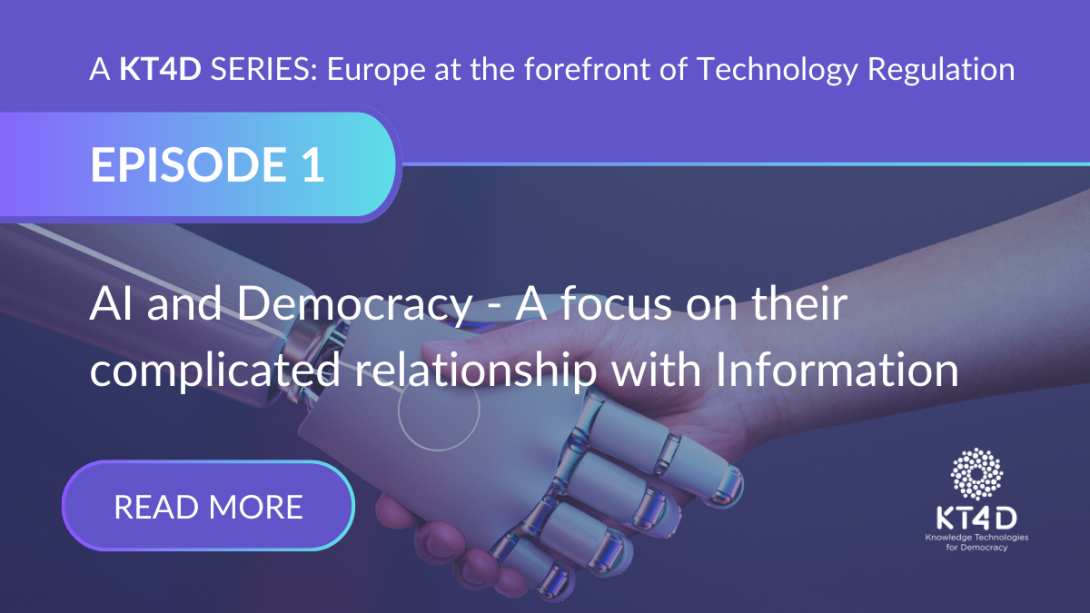EPISODE 1: AI and Democracy - A focus on their complicated relationship with Information
15, March, 2024

Author: Matilde Castleberry
It is almost impossible to avoid discussions of 'democracy' or 'Artificial Intelligence' in the contemporary world. Although these topics can appear ambiguous and conceptually distant, especially when considering that they often develop alternative interpretations as they travel across borders and emerge in local contexts. Yet they are irremediably intertwined into modern European society.
In this short series, KT4D will present and discuss the relationship between Knowledge Technologies - Artificial Intelligence and Big Data - and democracy. For the purpose of this article, we will use the definition of Knowledge Technologies provided by Jennifer Edmond - our Project Coordinator, during one of our past webinars entitled ‘Exploring the Benefits and Challenges of AI and Big Data for a more Inclusive Civic Participation',
‘Things that emerge at the intersection of cultural sensemaking practices and engineered objects bringing new affordances and constraints.’
We will explore the conditions causing the boom in AI-related public policies and focus on analysing the European AI Act just approved by the EU Commission. Join us and discover what Europe’s next steps might be.
Democracy and Information
Democracy comes from the Greek words dēmos (“people”) and kratos (“rule”) therefore, democracy is often said to mean ‘rule by the people’. In democratic countries, sovereignty is exercised directly or indirectly by the people, who resort to public consultation to choose their representatives.
In a country where people choose who to elect, they have the power to also choose a path for their entire nation. Guiding personal beliefs and the consumption of available information influences voters’ decision-making process. In a setting where people possess such power, it is essential that this information is unbiased and non-discriminative.
Information is power. Whoever manages to control the former, beholds the latter. The propaganda of totalitarian regimes targeting media and communication technologies, or later, the emergence itself of approaches like media democracy, seeking to reform mass media within democratic principles, are clear indicators of the symbiotic character of democracy and information. Information is something that must be managed with caution and that turns out to be particularly sensitive to technology changes, just imagine how the advent of newspapers, radios, televisions, or the Internet, has changed the way through which we take in and process information.
Technology and Information
Technology has the power to change how we visualise, process, and express information. Technological advancements like the radio and television revolutionised our world, posing new challenges to our societies and our policymakers.
The advent of the Internet and the speed at which technology has evolved in these last years had an enormous impact on the formulation and the fruition of information. During the previous decades, the amount of data to which we are exposed to daily has increased enormously, and so has the ease of acquiring it. AI sits at the forefront of this technological and data revolution. Underpinned by rapidly changing operational complexities, policymakers around the world attempt to understand how to effectively use these advancements to improve society, while grappling with the associated potential threats. But exactly, what is the relationship between AI and Democracy?
AI and Democracy
To understand the necessity of an AI Act, we must first understand what are the risks that AI poses to society, and in this particular case, to democracy. According to the Journal of Democracy, AI poses a threat to democratic governance by undermining representation, accountability, and trust - the bedrock of any political system.
Generative AI undermines democracy by flooding media and political discourse with content that ranges from meaningless chatter to misinformation. This hampers officials' understanding of constituent sentiment and weakens voter scrutiny of elected officials, eroding trust and potentially deepening polarisation.
Representation
Elected officials rely on public opinion polls to gauge preferences. In the age of generative AI, distinguishing between genuine and AI-generated communications becomes increasingly challenging. Generative AI also threatens the Public consultation procedure, vital for citizen input in policy making. While some view this process as democratically accountable, the manipulation potential of AI-generated comments undermines its integrity, like in the case of bot-generated comments.
Accountability
Generative AI poses a grave threat to democracy by enabling the creation of convincing fake content that can sway elections. Unlike previous efforts, this technology can mimic native speakers and flood platforms with believable propaganda. Combined with microtargeting, it could revolutionise disinformation campaigns, making elections less effective as a mechanism for holding officials accountable.
Trust
The proliferation of fake content online risks undermining trust in the entire information system, further eroding trust in government. Trust is essential for democracy, fostering civic engagement and resistance against threats to democratic values. AI advances make it harder to distinguish genuine from fake content, posing challenges for political elites and citizens alike.
Why an AI ACT
The rise of AI, like any new technology, brings forth ethical and security concerns that challenge us all. Europe has been at the forefront of addressing these issues, particularly regarding the impact of AI on democracy. In the upcoming article, we will delve into the European AI Act, examining its implications for democracy. Stay tuned for more insights!